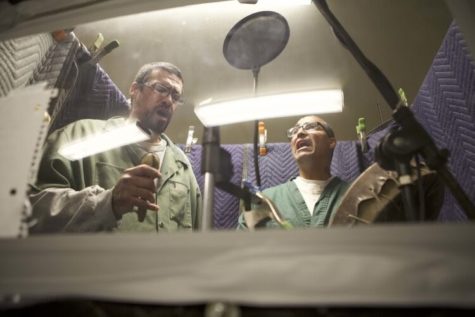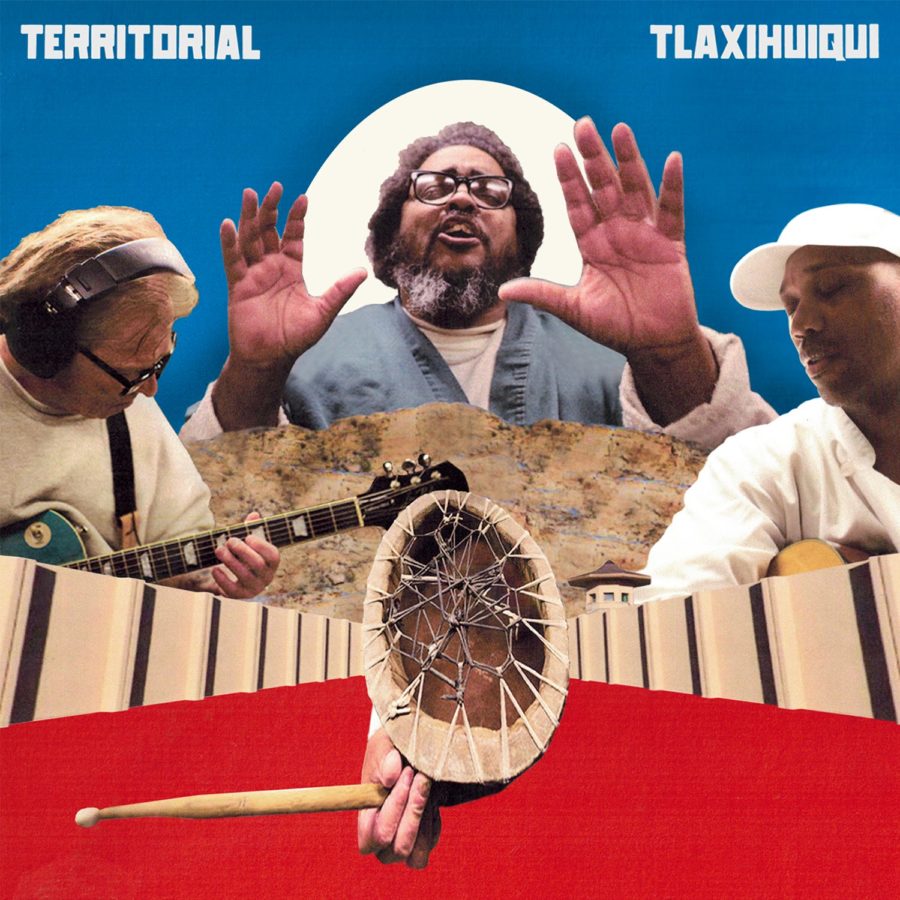Tlaxihuiqui: The Most Important Album of the Year
A review of Tlaxihiqui by Territorial, the masterful project recorded by seven convicted felons.
Here is Tlaxihuiqui’s album cover. It is designed by Die Jim Crow Records founder Fury Young.
The Colorado-based music group Territorial is far from your average band. The seven musicians that make up the group are diverse in age, versed in disparate styles, and come from decidedly different walks of life. Before they started recording together, the members of Territorial didn’t even get along. Perhaps the only two things the members had in common were that they were all convicted felons who loved music. When record label Die Jim Crow visited the Territorial Correctional Facility and offered these musicians the opportunity to produce an album, they proved that their few similarities were enough to usurp all of their differences.
In August of 2021, the album Tlaxihuiqui by Territorial was released. The album is not only a polished fusion of folk, blues, rock, hip-hop, and tribal music, but also a collection of personal stories and a striking platform for perspectives often ignored in American society. It is both an assemblage of enjoyable music and an important learning experience from start to finish.
The Territorial Correctional Facility opened in 1871 as American colonies pushed west into indigenous lands. It is the oldest prison in Colorado and in 150 years no music from its interior escaped to the free world. Now, Tlaxihuiqui opens the door.
This historical release would not have been possible without the work of Die Jim Crow Records, the self-proclaimed “first record label in the United States for justice-impacted musicians.” In 2018, Die Jim Crow founder Fury Young was approached by a woman named Claudia Whitman after a presentation about his record label.
Claudia had been friends with a multi-instrumentalist inmate named Micheal Tenneson for twenty years. She suggested Tenneson as a candidate for Young’s mission to collaborate with incarcerated and formerly-incarcerated musicians. Soon after, Young received a letter written by Tennseon himself.

Fury Young met with Rick Raemisch, the director of the Colorado Department of Corrections, who granted his team four days to record at the Territorial Correctional Facility in April of 2018. With Young’s help, Tenneson was able to bring together a group of seven musicians. Everything was set for Tlaxihuiqui to become a reality.
Halted by years of recording troubles and pandemic delays, Tlaxihuiqui came out on August 12th, 2021. The album is just as relevant now as the day it was conceived. As our country’s justice system becomes subject to more careful scrutiny from the outside-in, an album that gives a voice to those locked within the system we aim to reform is a crucial contribution.
The first track of the album is aptly titled “Tlaxihuiqui.” The song’s title (and album’s namesake) is pronounced Tla-She-Wiki. The word means “the calling of the spirits” in the Uto-Aztecan language of Nahautl. In the minute long intro, Phillip “Archi” Archuleta performs a Nahuatl chant over percussion from Gilbert “Lefty” Pacheco. It is a brief cut, but it still possesses great energy. The song’s lyrics may not mean much to most of Tlaxihuiqui’s listeners, but the emotion behind the chanting will prime listeners for the impassioned performances to come.
Track two, “America the Merciful,” is the only song on Tlaxihuiqui to be released as a single. Over the soft acoustic strumming of his own guitar, Dane “Zealot” Newton sings about “chasing the wind.” He asks America if his actions are “beyond forgiveness,” assuring that he has done all the redeeming he can do. His metaphor for “chasing the wind” represents the insurmountable challenge of being accepted by society despite his label as a felon.
As Zealot’s singing fades away, a rapper named Uno begins to lay down a verse. Uno, a Die Jim Crow artist from outside the Territorial group, recorded his verse in the Camille Griffin Graham Correctional Institution in South Carolina. He adds to Zealot’s argument, taking a stand against the “ones who make the laws” — those who financially benefit from the spread of fear and hate that causes the American public to see criminals as less than human. At the end of the song, Uno’s rapping fades into Zealot’s tender falsetto cries.
Despite recording from different sides of the country, the chemistry between Zealot and Uno is undeniable. Their parts fade seamlessly into each other, resulting in a song that is not unlike the singer-songwriter and rapper collaborations that dominate the radio. “America the Merciful” is a great single for Tlaxihuiqui, one that may have topped the charts if it had been released on a platform with more publication.

Track three, “Mama’s Cryin,” opens with smooth jazzy chords played on the guitar by Michael Tenneson. There is a slow, swinging drum beat. Singer Kevin Woodley enters with stunning energy. With a booming, soulful voice, Woodley describes a crime scene where the victim’s family is left distraught. His melodic phrases often end in a full, long-lasting vibrato. With his voice jumping all over the instrumental, his words demand full attention.
Later in the song, the background vocals dissipate and the drums shift to a faster-paced straight rhythm, making space for Jose “8Bizz” Talamantes’ verse. He continues on theme, rapping about the mourning of a victim’s family.
After a tasteful saxophone solo, Woodley concludes the track. His singing sometimes devolves into a shout, finding a way to shine through the busy instrumental. At the song’s end, a separate Die Jim Crow artist named “Simply, Naomi” croons “Don’t wanna see mama cry no more.” As the line passes, the music fades and the six minute epic comes to a close. The deeply personal and powerful lyric is universally relatable; it is nearly impossible to not sympathize with the singers on the track, even though their own crimes brought them the pain they speak of.
The next cut, “Remorse” is a spoken-word piece by Tenneson. Over a delicate organ, Tenneson speaks for nearly two minutes. Although it is just an interlude, “Remorse” shows the confident self-awareness that Tenneson has formed in his solitude. “There’s nothing I can do to erase the past. None of us can. We can go forward with our head high or we can go forward with it down,” said Michael Tenneson.
Song five, “V,” is a 12-bar blues featuring Tenneson’s vocals. The song captures the guilt that Tenneson has lived with since committing his crimes decades ago. Tenneson is not trying to hide from his past or seek unwarranted sympathy — he is simply being honest. During the chorus he sings, “The pain and loss I’ve caused so many, but it’s tearing me apart.”
Throughout the song, Tenneson’s voice is drenched with autotune and distortion. It is not the prettiest singing on this record, but perhaps this was a purposeful decision. The harrowing vocal effect causes Tenneson to sound more robot than human, possibly representing the way he is perceived by the outside world. In his attempts to convey his humanity, Tenneson’s message becomes distorted.
In fact, as “V” progresses, Tenneson’s lyrics only become less clear. As the roar of the background guitar grows, and the vocal effects layer more heavily, Tenneson drowns into the track. By the end of the song, he is gone completely. The song ends with a sustained note that begins with Tenneson singing the word “apart,” and becomes a rapidly pulsating, jarring synth.
The sixth Track, “Damn Fool,” is only a minute long. It features Kevin Woodley telling a goofy story about a courtyard interaction over the old-school blues fingerstyle guitar of Tenneson. It is not a particularly powerful song, but it is a moment of joy and laughter sandwiched between “V” and the equally challenging song that comes next.
“Just Say No” is the second 12-bar blues on the record, this time featuring a deeply personal performance from Woodley. He adds a gruffness to his voice, sounding less remorseful and more indignant than on previous tracks. In “Just Say No,” Woodley sings about his struggles with addiction pre-imprisonment. During his third verse, Woodley’s voice appears alongside snippets of a speech from Nancy Reagan’s “Just Say No” anti-drug campaign. Next to Woodley’s profession of struggle and dependency, Reagan’s response seems inappropriate. If Woodley could “just say no,” wouldn’t he have already done so?
Toward the end of the track, Woodley sings, “I don’t trust nobody who wears suit and tie anymore. I don’t trust nobody no more.” It is clear that the inaction of the United States’ government long left Woodley feeling betrayed. “Just Say No” is performed with the determination expected of someone who had to suppress these feelings for years.
During the eighth track, “8788,” Tenneson speaks for six minutes. Tenneson also incorporates bass, synths, and guitar into the track, creating an ominous beat that is looped under Frankie Domenico’s haunting violin riffs. Tenneson’s dialogue relives the day he woke up in solitary confinement. His confusion, anger, and remorse come across as authentically as if it truly was the day after his arrest.
“8788” is a very graphic song, in which Tenneson vividly describes the way he feels about his crimes and childhood trauma. Tenneson begins to cry as he apologizes to his mom and victims. The track is a stark reminder that you are actually listening to a man who has committed crimes, and that these crimes have had undeniably tragic effects on others. “8788” is also a reminder that such a person is still a human with emotions.

The song, like many others on Tlaxihuiqui, can be very difficult to listen to. It sticks out piercingly when compared to radio-friendly songs like “America the Merciful.” But it is impossible to listen to “8788” and remain unmoved.
“Chicahuac” is the transition from the album’s midsection to its closing act. The song opens with a Nahuatl chant. Phillip “Archi” Archuleta recites a prayer of grace in English before the song’s brisk conclusion.
Song 10, “Battlecry ‘14,” is the most bare track on Tlaxihuiqui. Recorded in the gym of the Territorial prison, “Battlecry ‘14” contains only the strumming of an acoustic guitar and Dane “Zealot” Newton’s singing. In the song’s lyrics, Zealot sings about his struggle for redemption. He knows that seeking forgiveness will be a weary effort, but he still recites his battle cry of “Hallelujah” before the journey embarks.
“Woodley” is another one of Tlaxihuiqui’s more lowkey tracks. Over a woozy blues backing, Kevin Woodley expresses pride despite his flaws. He repeatedly sings that all he wants to be “is Kevin Woodley.” Near the song’s end, Woodley says, “maybe someday you’ll reach out your hand to me. I’ll reach out and touch ya, and hold your own soul tight.” He is still eager to be forgiven for his crimes, but is now willing to wait until a hand is outstretched to him.
In the penultimate song, “Sailer,” the instrumental for “America the Merciful” is revamped with bright banjo and flute embellishments. Four members of Territorial offer dialogue, expressing gratitude for the ability to make music and communicate with the free world.
The closing track, “Holy Rain,” is a ballad from Michael Tenneson. Over jazzy guitar chords and smooth R&B licks, Tenneson sings a final song about redemption, asking to be washed by “holy rain.” During the song’s second half, Die Jim Crow artist “Simply, Naomi” offers her vocals. Simply, Naomi is a pianist and singer who was sentenced to life in prison in 1982. She served thirty-seven years before being commuted and released in 2019. In “Holy Rain,” she sings alongside Michael Tenneson, first offering him adlibs but later singing alone in the song’s outro. Despite not being a part of Territorial, Simply, Naomi has the last words on Tlaxihuiqui. Her words, sung from outside of prison, act as a beacon of hope, showing that redemption is possible for the members of Territorial — that they might be still forgiven by the outside world.

Tlaxihuiqui, in its finished form, is not just a project made within the Territorial Correctional Facility. Instrumental additions were recorded throughout the United States and added in post-production. But a clear majority of the content is performed by the inmates at Territorial Correctional Facility. With the four days they were given to provide the album’s content, Tlaxihuiqui is a truly impressive feat.
Since the album’s recording, many of the members of Territorial have been separated. Michael Tenneson no longer has contact with Kevin Woodley or Dane Newton. Given the circumstances, it is unlikely that another Territorial album will be produced. But more music from within prison walls, even from Territorial Correctional Facility itself, is almost certain. By being named after the institution in which its members are entrapped, Territorial represents something greater than itself. Tlaxihuiqui is the product of the musical talent in just one prison — Territorial. There are thousands of prisons in the United States whose residents have not been given the chance to produce an album. Tlaxihuiqui is not only the story of its seven creators, but that of unheard inmates across America who seek forgiveness everyday.
The fact that Tlaxihuiqui even exists is momentous. The story behind the album makes it unlike any other. And although the musical content of the album will be framed by each listener’s personal preferences, the power behind Tlaxihuiqui makes it the most important album of the year.
To listen to Tlaxihuiqui on YouTube Music, click HERE.
“There’s nothing I can do to erase the past. None of us can. We can go forward with our head high or we can go forward with it down,” said Michael Tenneson.
Ryan Goldsmith is a Staff Reporter for ‘The Science Survey.' He hopes to use his position to write articles that both uplift and inform his readers....











